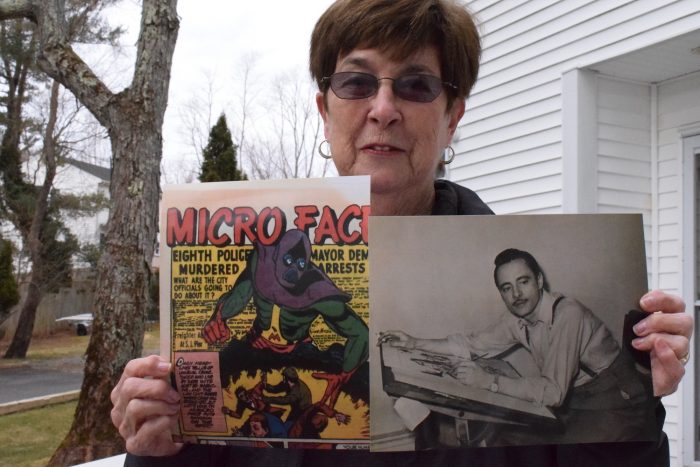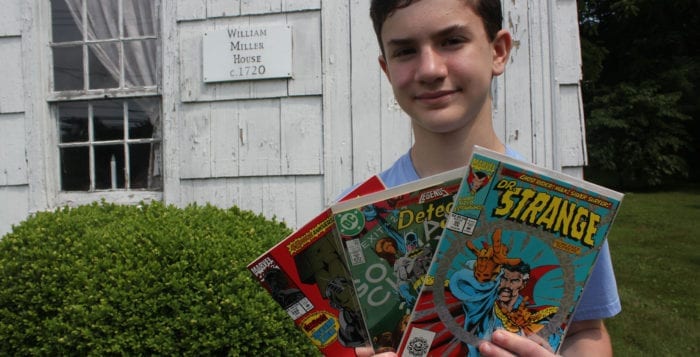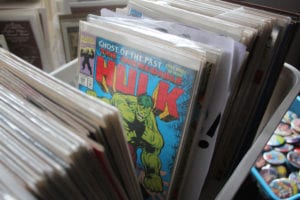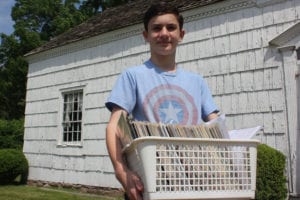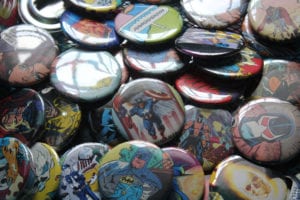A character who ended up in the public domain is now being resurrected, given a new life.
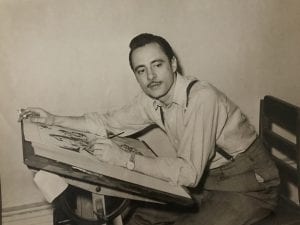
Peggy Loucks, of Port Jefferson, received a call last month from a co-host with NPR’s “Planet Money” podcast — a show that tries to find creative and entertaining ways to make sense of big, complicated economical processes — asking for her blessing regarding her late father, a comic book artist.
One time, the podcast made a T-shirt, tracing the supply chain from the cotton source to the factory. It purchased and followed the travel of 100 barrels of crude oil from ground to gas, and even launched a satellite.
In February, the podcast decided it wanted to purchase a superhero.
Kenny Malone, a co-host with the show, said that “Planet Money” wanted to investigate the superhero entertainment economy. He was joined by fellow host Robert Smith.
“Superhero movies had become the highest grossing movies — the merchandising around superheroes was also incredibly large,” Malone said. “So, we wanted to understand this.”
Malone noticed that characters who were making tons of money were not new — they were all characters that were between 40 to even 70 years old — and they are part of the two major superhero conglomerates, Marvel Comics and DC Comics.
“We had this idea,” he said. “What if we tried to buy a superhero off one of those companies? What if we tried to buy one of their older characters that is just not very well known? And then we could try to figure out how to build a mini-superhero empire.”
In need of a hero
The three-part series, which aired on Feb. 12, 19 and 26, dove into the team’s attempt to buy a superhero off Marvel — originally asking to bid for Doorman, whose superpower is to turn into a door. He never had his own movie for obvious reasons.
After several attempts to contact Marvel for interviews and to purchase the unhinged superhero, they declined and eventually stopped responding.
“We think they declined for an interesting economic reason,” Malone said. “Even the silliest unknown character has the potential to become a $10 million, $100 million piece of intellectual property.”
In its first episode of the series, “We Buy a Superhero: Origins,” the duo mentioned “Guardians of the Galaxy” character Groot who was once deemed undesirable, but who is now a pop-culture icon.
The guys behind “Planet Money” had to find a new tactic. They were on a mission. They began looking into copyright law and what happens to a creative entity when it gets moved to the public domain.
“Every piece of copyright eventually falls out of copyright and gets put into the public domain where it is fair game for anybody to do something with,” Malone said.
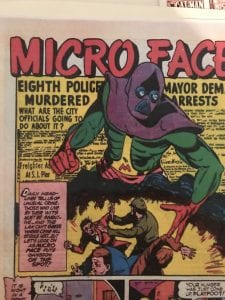
Part of it is to incentivize creativity, he added, where the creator can get exclusive rights to it, and make a profit. But the other part of it, is as a country when copyright law was established, was that if people hold onto that copyright forever, it could stifle creativity.
“A second phase of creativity can be spawned, and people can do things with those characters, songs, books,” Malone said. “And much to our delight, we learned characters fall into the public domain. Superheroes will eventually fall into the public domain.”
Malone and Smith began delving into the world of public domain superheroes, going through hundreds upon hundreds of characters who once graced the pages of books.
“We stumbled across this character that we could not believe was real,” he said. “We couldn’t believe it was not custom made for us.”
That character was from the golden age of superheroes, created in the 1940s featuring a mask and giant microphone upon his face as his power. His name was Micro-Face, who appeared in Clue Comics from Hillman publishing.
A podcaster of the past
“This is basically like a 1940s podcaster, even though they didn’t know what a podcast was yet,” Malone said. “We loved it.”
Micro-Face was in the public domain — so he was fair game to do anything with — but the guys at “Planet Money” wanted to find out more about this lost superhero. That’s when they found out that the artist who created him, Allen Ulmer, had a daughter who was still alive and living right here in Port Jefferson.
According to Loucks, Ulmer, who passed away in 1984 at age 64, was an artist back in the golden age of comic books. Born in Lancaster, Pennsylvania, he studied at the Pennsylvania School of the Fine Arts in Philadelphia, but always loved creating his own comic characters.
“So, he moved to New York City and joined the art league there,” Loucks said.
Ulmer began working for several different comic book companies, including Marvel, DC and Hillman. He took a break from drawing when he served in World War II, but then came back from the war and continued his artistry until the 1950s.
But during that time, there was an attack on the superhero industry that no one could help save. Between the McCarthy era, plus the backlash among parents who blamed comic books for their children’s delinquency, comic books became censored and hundreds of artists and publishers lost their jobs.
“My father was on that blacklist,” she said.
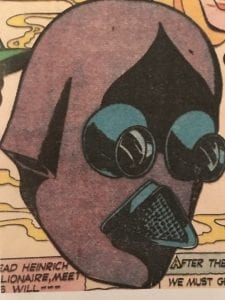
Now 83, and a retired librarian from the Middle Country Public Library, Loucks was just 5 when her father initially created the superhero now getting a facelift.
“Micro-Face was one of his favorite characters [who] never had the chance to take off,” Loucks said.
When Ulmer lost his job, he moved his family to Long Island where he was a founder of the Port Jefferson Arts Festival and a member of the Art League of Long Island of Dix Hills. He began focusing on fine art and educational film, never doing comics again.
For whatever reason, the publisher decided decades ago not to renew the copyright for Micro-Face, leaving the character to fall into the public domain.
Malone and Smith knew they didn’t necessarily have to ask Loucks for her permission to use the character, but they felt it was right to talk to her, find out more about his creator and keep that legacy alive.
“My father would have loved this,” Loucks said. “You know, who would have thought that after all these years? Here comes this character back into the public eye again.”
The future of Micro-Face
Malone said that now that the three-part series is completed — and available for streaming online now — they will continue working toward actually creating a comic book based on Micro-Face.
Working alongside comic book industry leaders, the team plans on writing a book based on the grandson Tom Wood — the alter ego of Micro-Face originally drawn by Ulmer in the ’40s.
“This person is our new character and he works in radio like us,” Malone said. “So, this is going to allow us to write in some plot points about business and economics and have a little bit of learning … but this is fundamentally still a comic book and is inspired by the direct heritage to the character Peggy’s father created.”
Malone said he does not know the exact release date of the comic book, but it is currently being worked on by the new Micro-Face team at “Planet Money.” Joining the podcasters are Alex Segura, co-president of Archie Comics and friend of Malone, Jerry Ordway, Peter Krause, Taylor Esposito and Ellie Wright — “all of who know what they’re doing when it comes to building a comic empire,” Malone said.
He added that to continue with the “Planet Money” way of immersing themselves into the actual process, they will be updating listeners every step of the way.
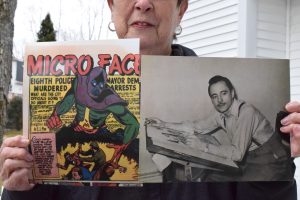
“We’re very excited about it,” Malone said. “You start these things, and you don’t know where they’re going to take you, but Peggy is just amazing and her father really was prolific. It makes me very sad to think that he clearly was very good and very creative, and the industry just was rocked in a way that knocked a lot of people out of it.”
While listeners and comic book lovers wait for the revival of Micro-Face, T-shirts are currently available on NPR’s website featuring Ulmer’s original design. Proceeds from the sales go back to the nonprofit National Public Radio to support radio shows and reporting.
“Peggy told us that she was very excited about this,” Malone said. “Her father would have liked this project, so that made us very happy and made it make us feel good going forward with this.”
Stay tuned.

